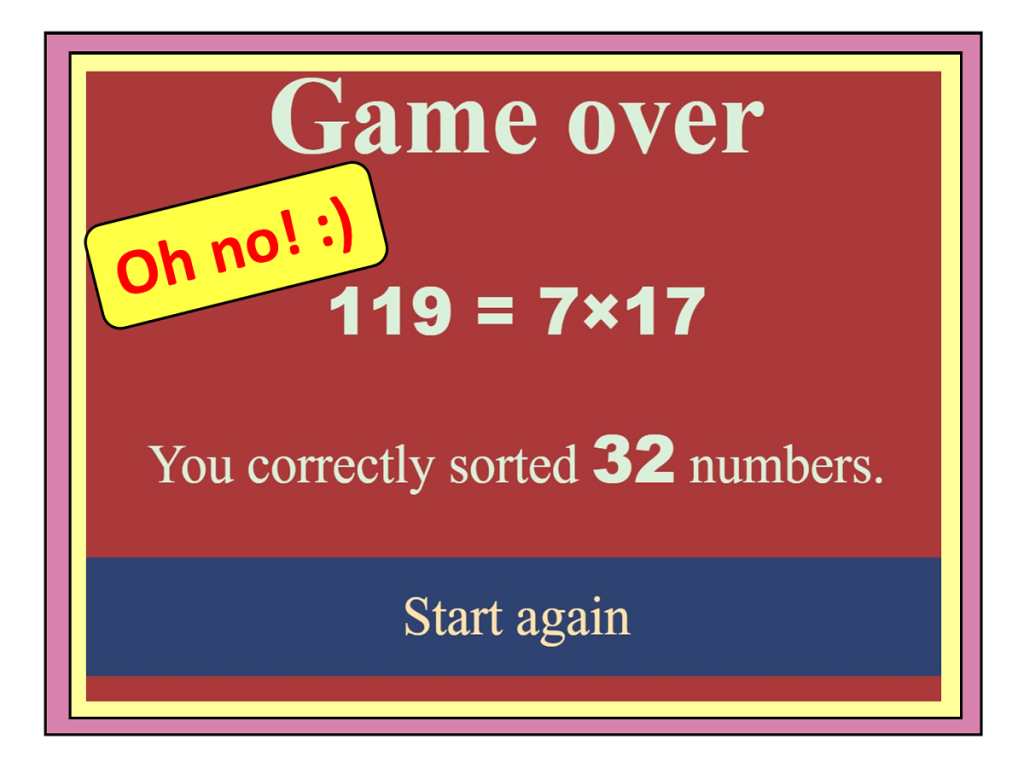
Seven is a difficult number!
It’s really easy to see whether a whole number is divisible by (it has to end in or ), by (the sum of its digits has to be divisible by ) or by (it has to end in or ). But what about ?
Here’s one way we can do it. We’ll then see some examples, and then see why this bizarre test works!
To see if a whole number is divisible by 7: remove the last digit, double it and subtract that from what’s left. If this gives you a number that’s divisible by 7 then your starting number is also divisible by 7.
Wow – what a strange looking test! Let’s see it in action:
AN EXAMPLE:
I wonder if is a multiple of ? Let’s subtract double the last digit from what’s left:
.
is a multiple of (it’s ). This means that is also divisible by (in fact ).
ANOTHER EXAMPLE:
Let’s see if is divisible by :
We subtract twice the final digit from what’s left:
.
Hmm, I still don’t know if is a multiple of , so let’s go round again:
.
is NOT a multiple of , meaning that neither is or .
WHEN WOULD I ACTUALLY USE THIS?
If this all seems a bit complicated: well yes, I agree! BUT it’s particularly quick and easy for short numbers that end in or , such as or .
At first glance, both of these numbers look prime: they certainly don’t divide by or (if you know your times tables up to ) by
Let’s check for divisibility by :
so YES
so YES – both and are both divisible by (, and ).
Before we see why this strange trick works, why not try your skills out by playing Is This Prime? The game shows you a number (they all seem to be less than so it’s not too hard), all you have to do is decide if you think it is a prime number then click YES or NO. It’s great fun, although even after months of trying I cannot score more than points in a minute!! How many can you score?
OPTIONAL: WHY DOES THIS WEIRD TRICK WORK?
To answer this we will need a little algebra, and an intermediate result called a lemma. Algebra is the language of patterns, so it’s usually the best way to see why number tricks like this work! A lemma is just a small, less important result that we need to prove a bigger more important result.
LEMMA: multiplying a number by 10 does not change whether or not it is divisible by 7
For instance, is divisible by (it’s ), this means that is too. is not divisible by ,this means that isn’t divisible by either.
One way to see why it works is to think about the number written as the product of its prime factors (e.g.). Multiplying by ten will add a and a to the product (). This cannot affect whether or not appears in the list! At a more sophisticated level, multiplying by does not affect a number’s divisibility by because and are coprime (they have no prime factors in common). If you’re happy to accept that the lemma works, we can now look at our main result:
Suppose we want to test a number for divisibility by : let’s call this our starting number. I’m going to call the final digit , and what’s left after removing it I will call $a$. After subtracting twice from , we reach our end number.
EXAMPLE: if our starting number is then and . Our end number is
Our starting number is a moved one place to the left (you can do this by multiplying by ) and then with tagged on the end. So
start number =
end number = because you subtract twice the final digit from what’s left .
Algebra can give us a clever relationship between the two:
(you can expand the brackets to check that both sides are the same).
The term on the right is ALWAYS a multiple of . This means that our starting number will be a multiple of exactly when is a multiple of (because then all three terms are multiples of ). And our lemma from earlier tells us that is a multiple of exactly when our end number is a multiple of .
Now we know why test works, try using it to decide which of these numbers are divisible by :
.
And please do have a go at the Is This Prime game!
